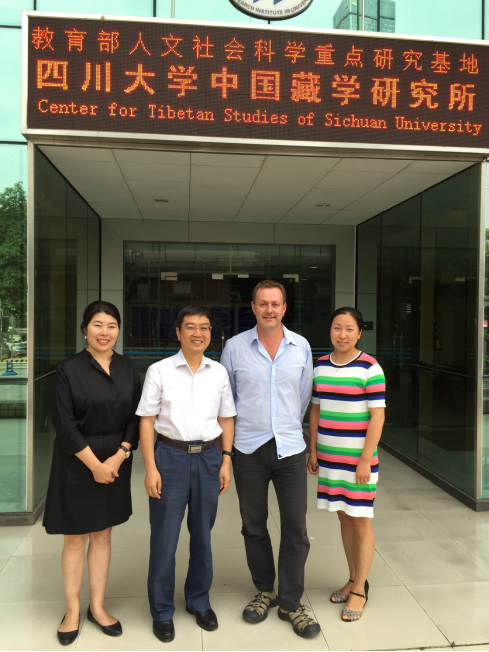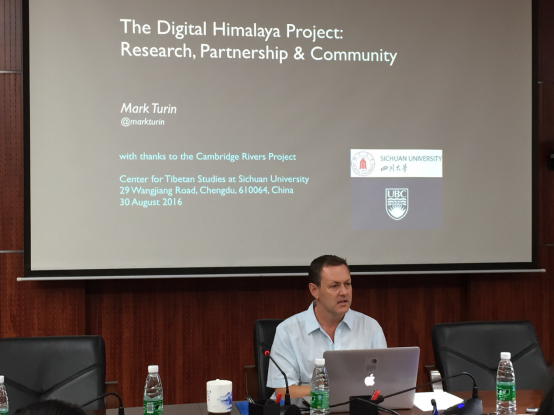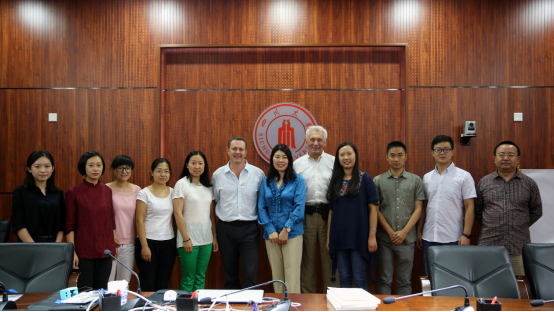August 27th - 31st, 2016, Prof. Mark Turin of the Department of Anthropology, University of British Columbia, Key Member of “Cambridge Rivers Project”, head of a research center for endangered languages and Executive Editor-in-chief of HIMALAYA, visited Sichuan University for a series of academic activities.
Prof. Mark Turin is one of the 16 members of the “Cambridge Rivers Project” introduced by our university. In addition to lecturing at SCU, his visit was mainly intended for negotiation with our project teams related to the development of Himalayan Multimedia Database and the founding of journal Himalayan Studies among others.
With respect to the above issues and the expanding of cooperation with relevant overseas research institutes, the Himalayan Multimedia Database project arranged respective team, including computer experts’ team, translators’ team and journal preparation team, to have a week-long intensive and profound discussions with Prof. Mark Turin and Prof. Fernand Meyer, former Director of the Center for Himalayan Studies under Le Centre National de la Recherché Scientifique, who visited SCU at the same time. Prof. Mark Turin donated generously some 60G of PDF files concerning the studies of Himalayan region and over 3000 precious Himalayan region maps collected by him to SCU Database, and promised to donate and transplant five courses of the “First Nations and Endangered Languages Program” under his leadership and related material to our university.
Prof. Luo Zhongshu, co-chairman of the Himalayan Multimedia Database project and Vice Chairman of SCU University Council, met with Prof. Mark Turin two times, on the day of his arrival and the day when he successfully completed his missions at SCU respectively. They held in-depth talks on how to organize high-end international academic conferences efficiently, how to organize training on Himalayan regional language courses, how to co-found the research journal concerned and facilitate SCU to grow into a new center and a new highland in international community of Himalayan studies. During his visit, Prof. Mark Turin delivered two academic lectures: “Digital Himalaya Project: Research, Partnership & Community”, and “Vanishing Voices: The Case for Collaborative Language Documentation”.

Taking the digital Himalaya project led and created by himself as an example, Professor Mark Turin raised some questions faced by the current European and American countries in handling the Himalayan literature and resources. And in the form of video, audio and pictures, he showed the music, dance and religious rituals and their changes in northeastern India’s Gurung and Nepal’s Naga in the Himalayas region since the 19th century, as well as in the Gansu and Yunnan regions of China, in a view to stress the value and importance of digital technologies for Himalayan research.
While as an anthropologist and linguist, in his lecture "Vanishing Voices: The Case for Collaborative Language Documentation", Professor Mark Turin recounted how he has spent more than a decade in saving and recording endangered languages in the Himalayan region with anthropological research methods and modern digital technologies and means. He emphasized the importance of forging emotional bonds with local communities and conducting collaborative research based on that. He also put forward some opinions on the ethnic policies of Nepal in the context of democratization and modernization, the differences between China’s and Nepal’s language protection policies and the reasons, minority languages’ choice of traditionalization or modernization, and the handling of local common people’s demands during anthropological fieldwork.

The lectures were chaired by Prof. Xu Jun from the Center for Tibetan Studies, and Executive Chairman of SCU Himalayan Multimedia Database, and interpreted by Dr. Liu Yang, associate researcher of the CWF, and doctoral candidate Gao Xiaojuan of SCU’s School of History and Culture. The teachers and students from the CWF, the Center for Tibetan Studies and the College of Foreign Languages of SCU, as well as the representative of Southwest University for Nationalities attended the lectures.

